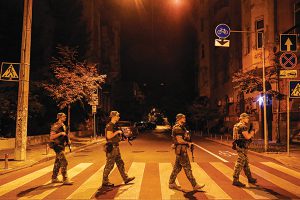The Ukraine war is entering its third phase, and this one could well be decisive.
Phase one was Russia’s failed blitzkrieg, meant to destroy the Ukrainian state. Phase two, which continues in desultory fashion, was Moscow’s push to seize all the Donbas area along the Ukraine-Russia border.
Phase three will feature a Ukrainian counteroffensive in the south. If Ukraine can retake enough territory — without trying to do too much — it might tip the war conclusively in its favour. If it can’t, Kyiv will have a cold winter ahead.
The cold is, of course, a vital part of Russian President Vladimir Putin’s strategy. He believes time still favours Russia, at least in the near term. By the end of this year, the Western democracies will be running short of the weapons and ammunition Kiev needs. They will be tired of injecting ever-more money into Ukraine’s moribund economy.
Meanwhile, the global dislocations caused by disruptions of Ukrainian wheat shipments will intensify, even if the shaky new deal to resume exports from the Black Sea port at Odesa holds. And Europe will shiver as winter sets in and gas supplies run low — a shortage Putin is now ensuring by cutting gas flows so that European countries won’t have adequate reserves as cold weather approaches. His gamble is that economic discomfort will cause the West to yield before Russia plunges into economic disaster.
In these circumstances, Putin calculates, the aid Ukraine has received from the democratic world will wane; the pressure on Kyiv to accept a cease-fire will mount. Moscow could then claim victory on grounds that it holds significantly more Ukrainian territory than it did before the invasion on February 24.
The Russians could also use this occupied territory to regroup for a future assault, whether next year or several years from now, to force the government from Kyiv or to cripple what’s left of Ukraine’s economy by taking Odesa. This might be a Pyrrhic victory for Putin, given the losses Russia has suffered, but it would be a catastrophe for a dismembered, abandoned Ukraine.
Thus the significance of Ukraine’s push in the south. It’s no secret that that Ukraine is getting ready
to attack there. The government of President Volodymyr Zelenskiy has warned civilians to leave the area and begun using long-range artillery to isolate Moscow’s forces. Ukraine is already retaking smaller towns along the route to the southern port city of Kherson, the first major population center Russia occupied, while massing units for a larger assault.
Although the conflict in Ukraine has slowed to a war of attrition, there is great
urgency to this offensive. Ukraine needs to claw back territory in the south to preempt Russia from annexing those areas — in clear violation of international law — which would make their eventual recovery far less likely. A successful Ukrainian offensive could eliminate the danger of a renewed Russian push toward Odesa. It could also bring Russia’s transportation links to Crimea, as well as some key military
installations there, within range of Ukrainian artillery.
Yet the real imperative is psychological. As military analysts Michael Kofman and Lawrence Freedman have argued, both sides are struggling to shape perceptions — each other’s and the outside world’s — of where this war is headed. Ukraine must show its Western backers that it can eventually win, so that they will stick with Kyiv and give it the wherewithal for more offensives in the future, even as the economic and military costs rise.
If Ukraine can do this, then time will likely be on its side after all. Recent research by scholars at the Yale School of Management indicates that government sanctions and private-sector ostracism are driving Putin’s economy towards the precipice. In a war that continues into 2023, Putin will also have to reckon with the exhaustion of his poorly motivated military, unless he undertakes a conscription of Russian citizens that would be full of political risk. But the window for Ukraine to make its case won’t stay open forever. As the US midterm elections approach and other global crises erupt, Kyiv’s struggle could become yesterday’s news.
—Bloomberg
Hal Brands is a Bloomberg Opinion columnist. The Henry Kissinger Distinguished Professor at Johns Hopkins University’s School of Advanced International Studies, he is co-author, most recently, of “Danger Zone: The Coming Conflict with China†and a member of the State Department’s Foreign Affairs Policy Board
 The Gulf Time Newspaper One of the finest business newspapers in the UAE brought to you by our professional writers and editors.
The Gulf Time Newspaper One of the finest business newspapers in the UAE brought to you by our professional writers and editors.

